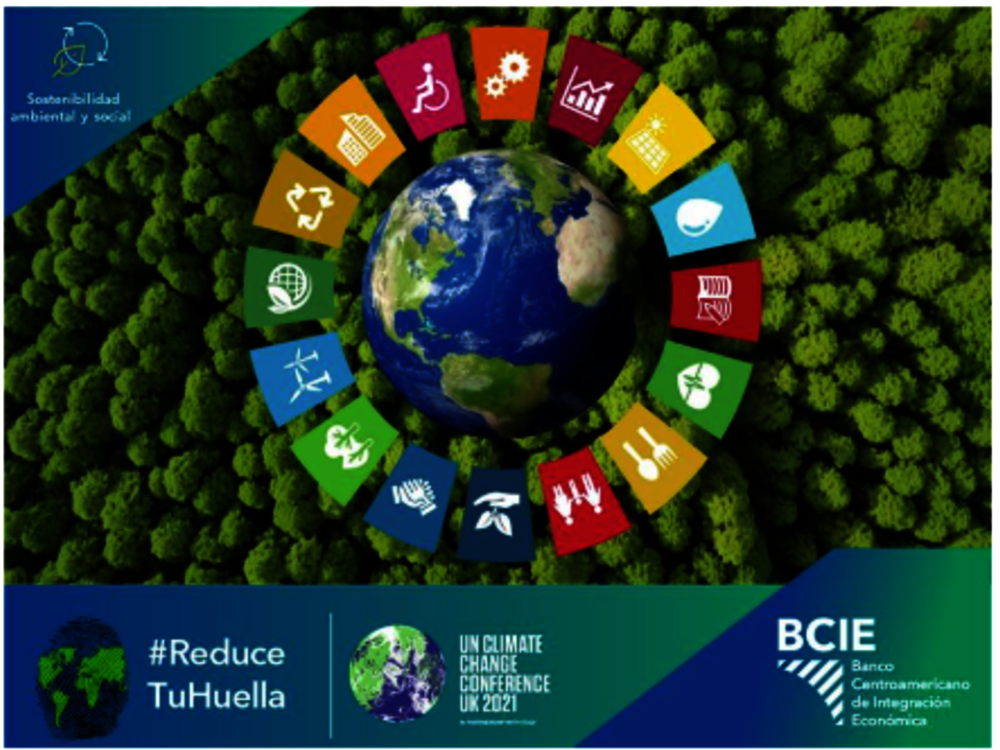CABEI shows world leaders the momentum for sustainable projects aligned with the 2030 sustainable development goals

Within the framework of COP26, CABEI is participating in various meetings to discuss issues related to financing and promoting green projects in different sectors.
Tegucigalpa, November 11, 2021.- This November, world leaders are meeting at the United Nations Climate Change Conference (COP26) to discuss actions to address global warming, including the Central American Bank for Economic Integration (CABEI), which is presenting some of the initiatives it is implementing in the region and their close link to the 2030 linkage with the Sustainable Development Goals (SDGs).
Among the initiatives presented was Costa Rica's Electric Passenger Train, presented in two panel discussions during the Summit as the flagship zero-emissions public transportation project in Latin America, which is financed by CABEI for US$550 million and recently received support from the Green Climate Fund (GCF) for US$271.3 million.
During the first week of COP26, CABEI also participated in other meetings such as one on financing MSMEs for a green, resilient and inclusive recovery in the region, which it co-organized with the Taiwan International Development Cooperation Fund (TaiwanICDF) and in which it discussed how innovative financial mechanisms can help transformation, especially for the recovery of businesses owned or led by women after COVID-19, among other solutions.
The Bank served as a panelist at an event organized by the Agence Française de Développement (AFD) to share knowledge and disseminate best practices on how to implement green building portfolios; and co-organized a forum with the GCF, the Central American Environment and Development Commission (CCAD) and the United Nations Environment Program (UNEP) on how new financing schemes have been forged at CABEI and regional initiatives such as the Dry Corridor as an example of an adaptation project to increase climate resilience in Central America.
During the second week of the World Summit, CABEI's Integrity and Compliance Office will participate in a meeting where the importance of integrity measures to avoid maladaptation of climate change projects will be presented, for which CABEI and entities such as GCF, Water Integrity Network,
Transparency International, among others, contributed to the preparation of a thematic summary that addresses the risks of maladaptation, conclusions, and key recommendations.
For a sustainable Central America
Two of the main causes of migration in the countries of the region are vulnerability to climate change and economic and social exclusion. According to the German Watch Climate Risk Index (CRI), of the countries in the world with high and medium-high climate risk, six correspond to the Central American and Caribbean region: Honduras, Guatemala, Haiti, Nicaragua, Dominican Republic, El Salvador.
In this context, CABEI's Board of Governors has expressed its commitment to climate change through two declarations: the first, made in 2016, established a commitment to promote and contribute with actions that seek adaptation and mitigation of climate change in order to support its member countries in meeting the goals established in the COP21 (Paris Agreement); while the second, is the zero coal declaration, made in 2019, with which the Bank's commitment to refrain from financing projects related to the exploration and extraction of coal, as well as the generation of energy from it, was noted.
In the last five years, CABEI has channeled US$5.7 billion in climate change operations, which represents 41% of total approvals, in addition to US$1.5 billion from external sources for the execution of projects focused on sectors such as health, poverty eradication, water and sanitation, energy and renewable mobility, and sustainable cities, among others.
Among the initiatives promoted by CABEI are the US$2,513.0 million Resilient Reconstruction Program, aimed at providing resources to finance projects that address and prevent natural disasters; the Bio-Climate Project in Nicaragua; the Central American Dry Corridor and Arid Zones Project in the Dominican Republic; and the CAMBio II Program.
In addition, the Bank is currently working actively to design innovative financial instruments such as social and green bonds, which to date have been issued for US$375.0 million in the first case, and US$500.0 million in the second, in order to support the governments of the region in meeting climate change goals.





